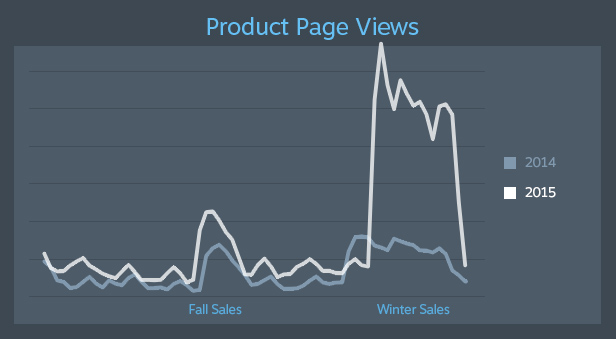Anyone who has experienced a Steam sale in the past will be familiar with how they work: savings on the majority of titles with daily and flash sales offering even deeper discounts. In the store's Autumn and Winter sales, however, this format was changed. All games were given a single discount that lasted the entire sale and the front page served only to highlight discounts. Despite the change, it's estimated that the Winter Sale brought in "at least" $270 million in revenue - nearly double what the Summer Sale generated.
Valve said that getting rid of daily and flash sales was done as "a better way to serve customers that may only be able to visit Steam once or twice during the 13-day event." The company added: "We also saw this change as an opportunity to showcase a deeper variety of titles to customers each day, while having confidence that any game being highlighted would be at its lowest discount."
Even though many gamers said the new format made the Winter Sale less exciting, it was still a huge success for Valve. The company accidentally posted the sale's statistics on a public Steam forum; it revealed that offering users a free Steam Trading Card for browsing through their personalized discovery queue was one of the main reasons behind the Winter Sale success.

While Valve's post doesn't mention specific monetary figures, Steam Spy - a service that estimates data and statistics about Steam based on game ownership - estimates that the Winter Sale brought in about $270 million in revenue across 46 million sales. Almost one tenth of this money came from the sales of Fallout 4 and Grand Theft Auto V, both of which were discounted.
It wasn't just the big-name titles that sold well during the Winter Sale. "As with past years, popular hits continue to sell well during major sales events. But what about the thousands of other titles on Steam?" Valve wrote. "We looked at performance of the group of games outside of the Top 500 in revenue terms. This group collected 35 percent of product page traffic during the sale, which is over 4x their share of traffic from the previous winter sale. And these weren't just idle views---we also saw 45 percent growth in the revenue generated by this group of games as compared with the last winter sale."

The success of the sale comes despite a Christmas day issue that revealed members' account information, including email address, purchase history, and how much they had in their Steam wallet, to other users. Valve initially said this was due to a caching issue and not a hack, but later admitted that the problem was the result of a DDoS attack.
